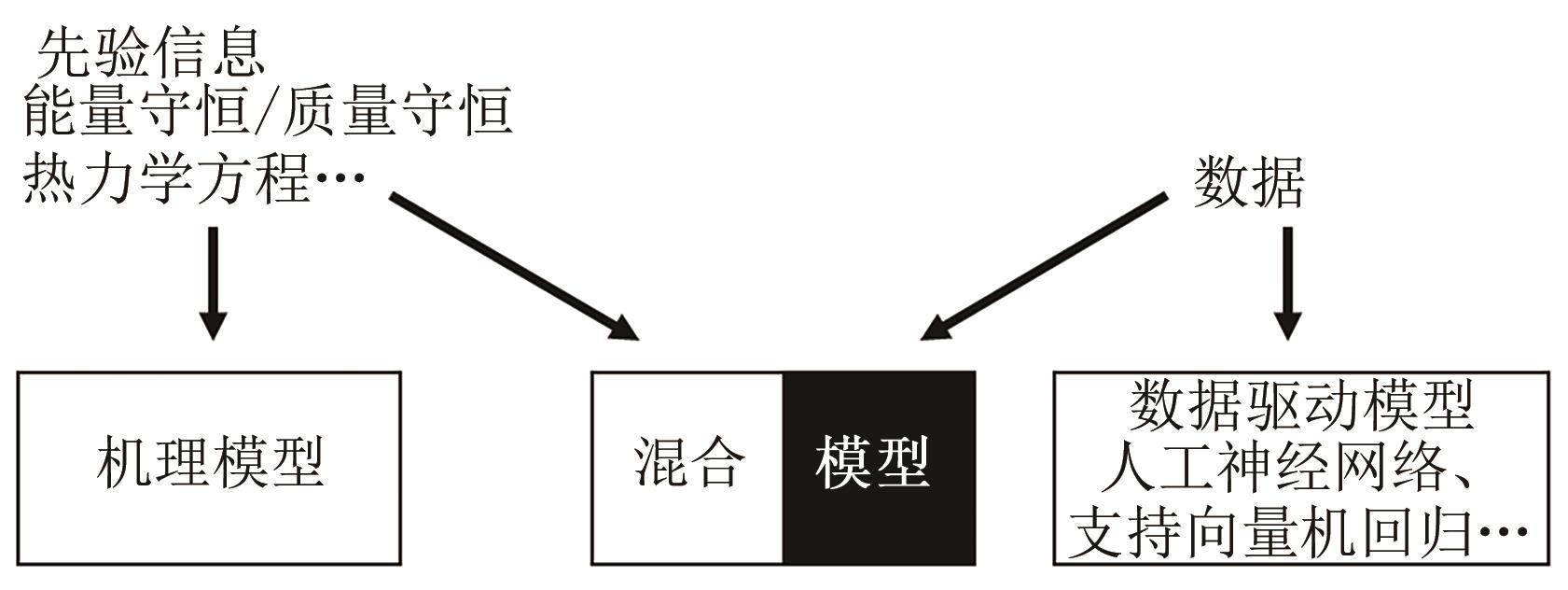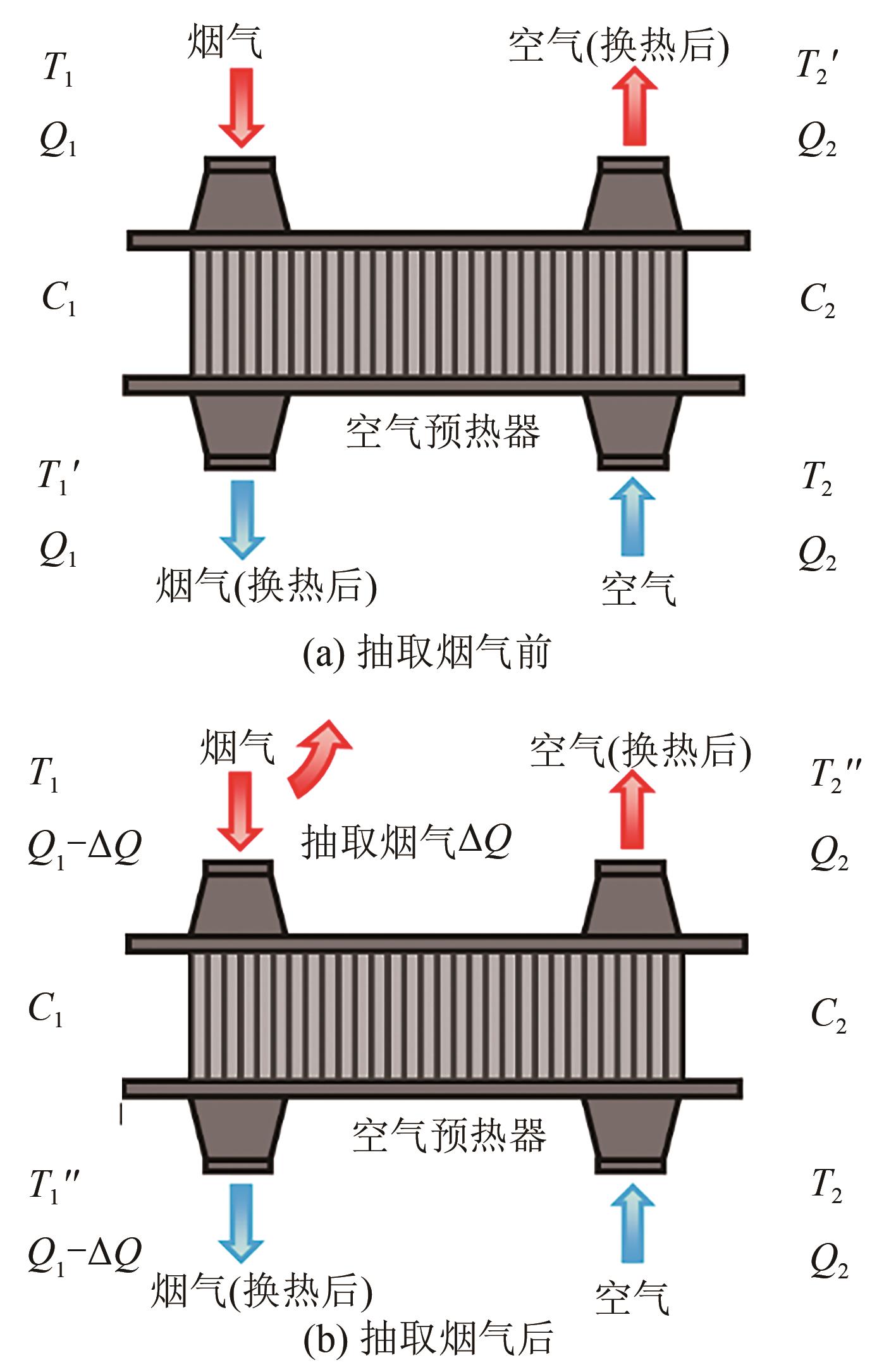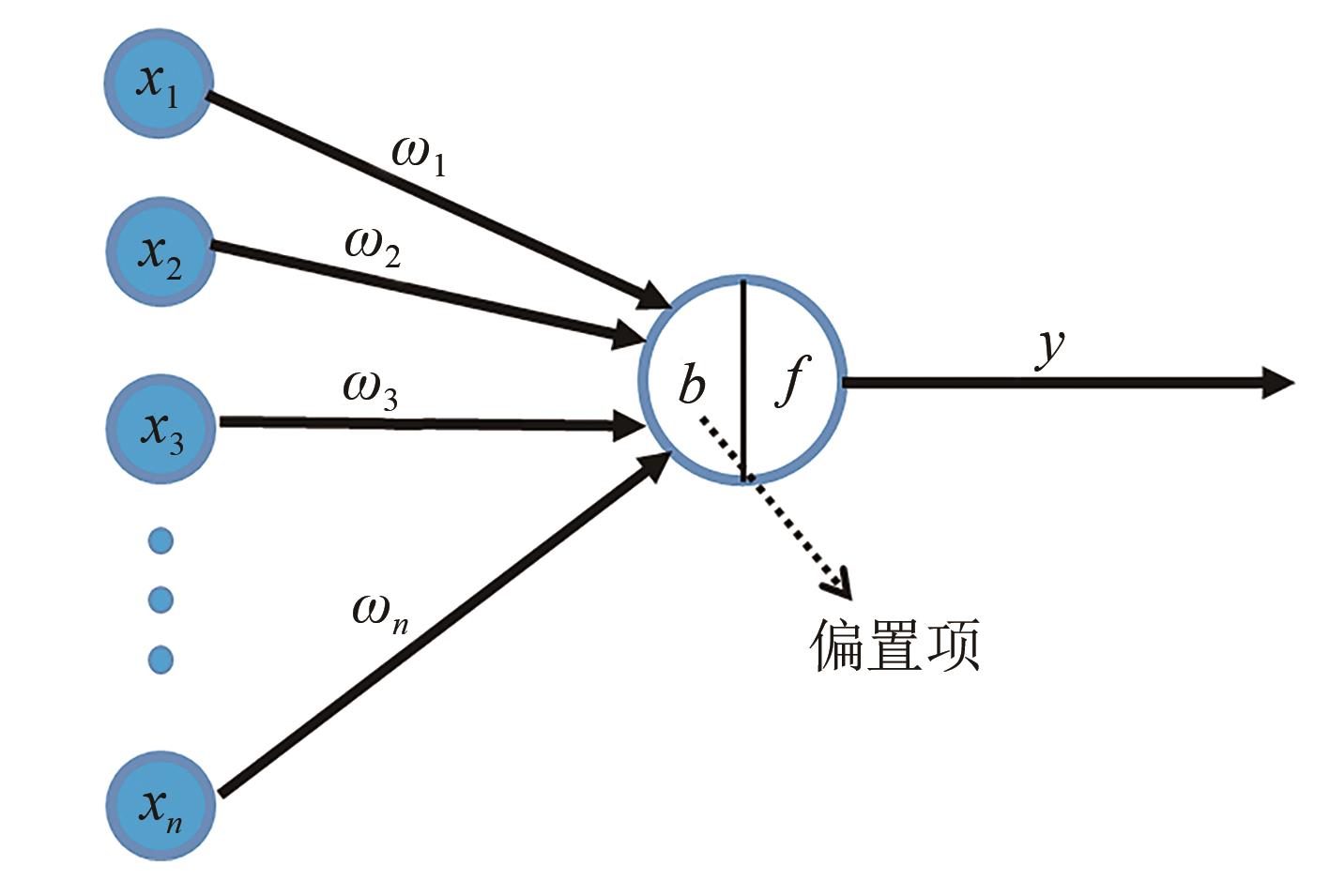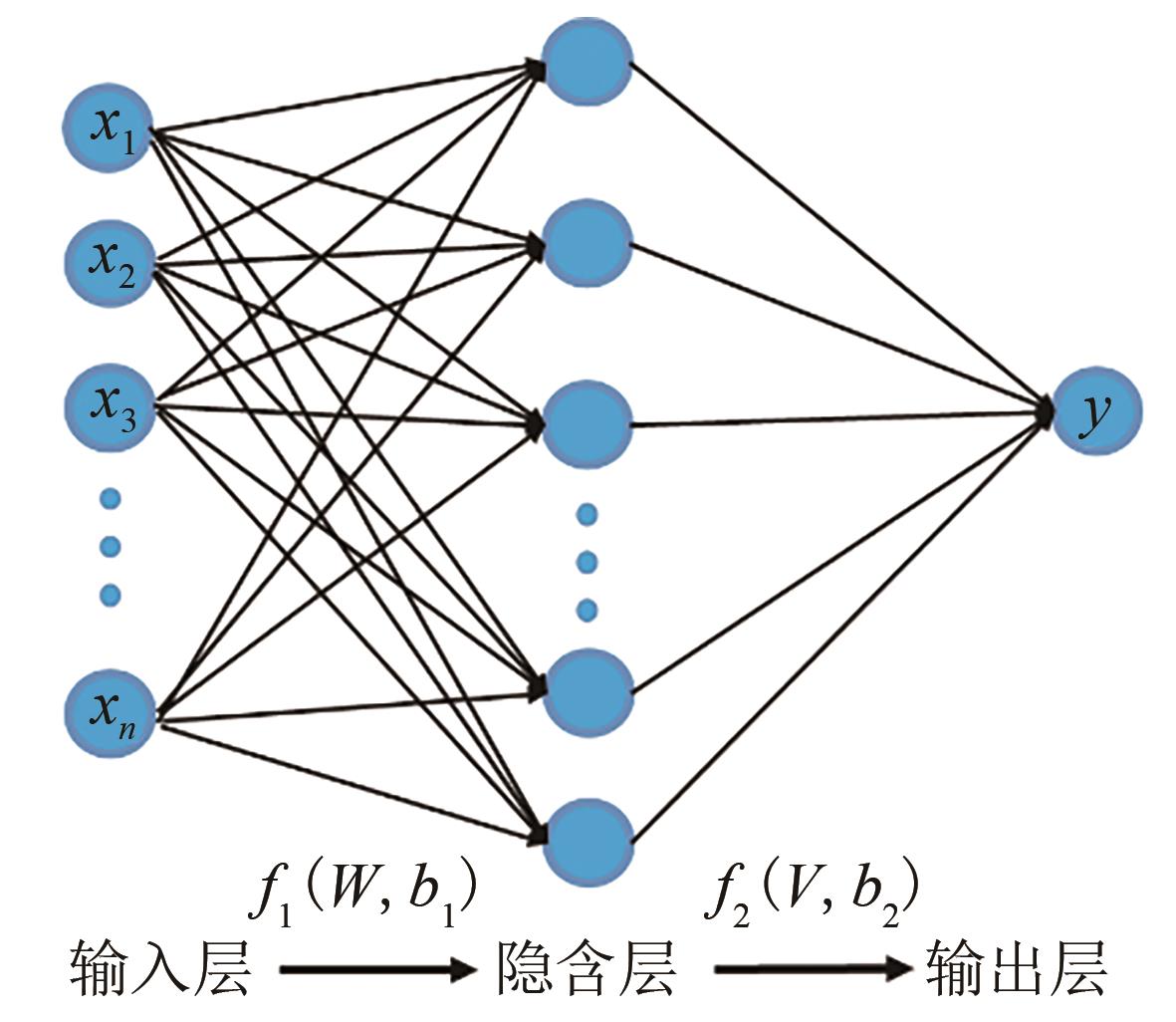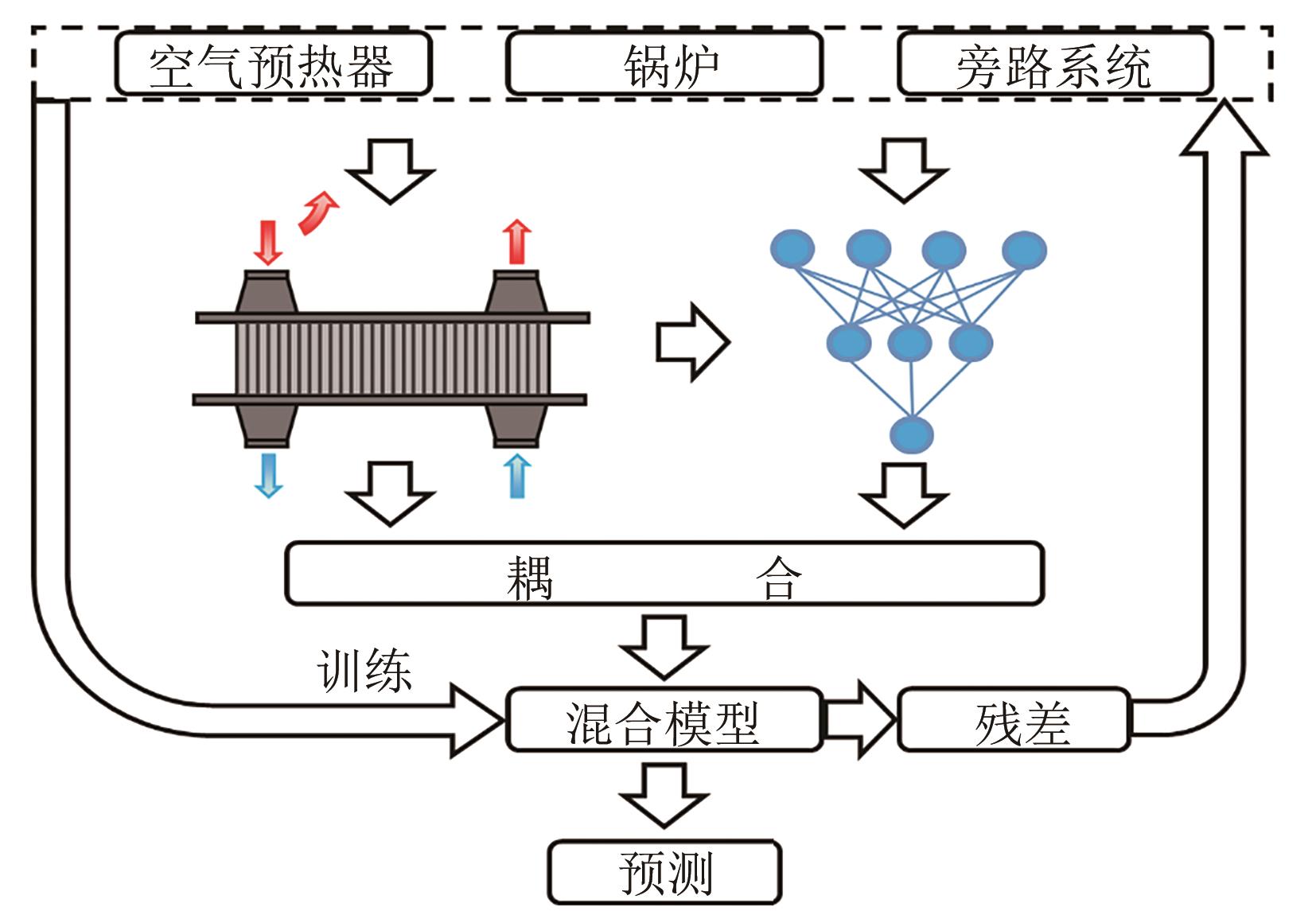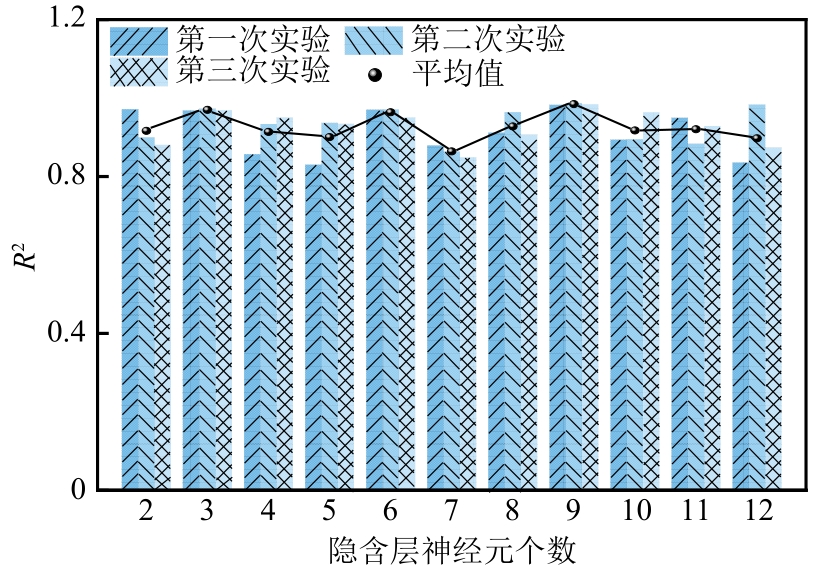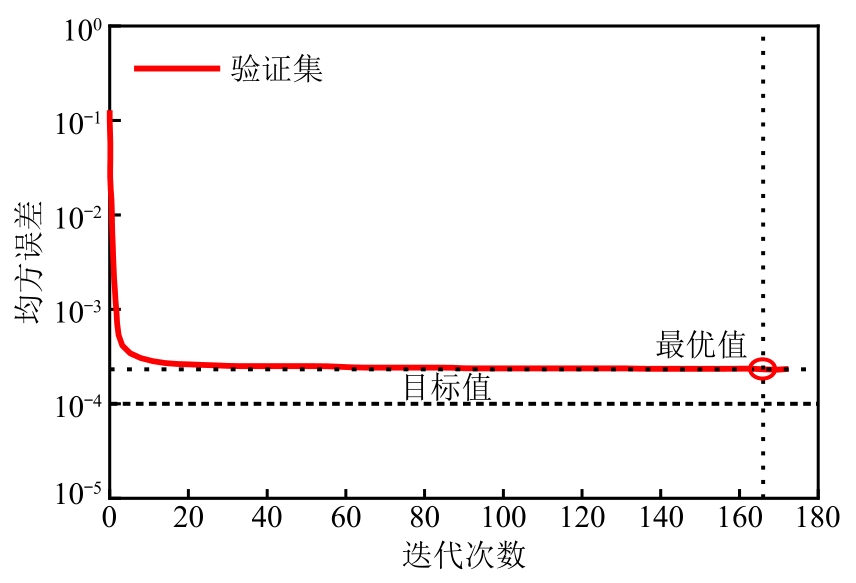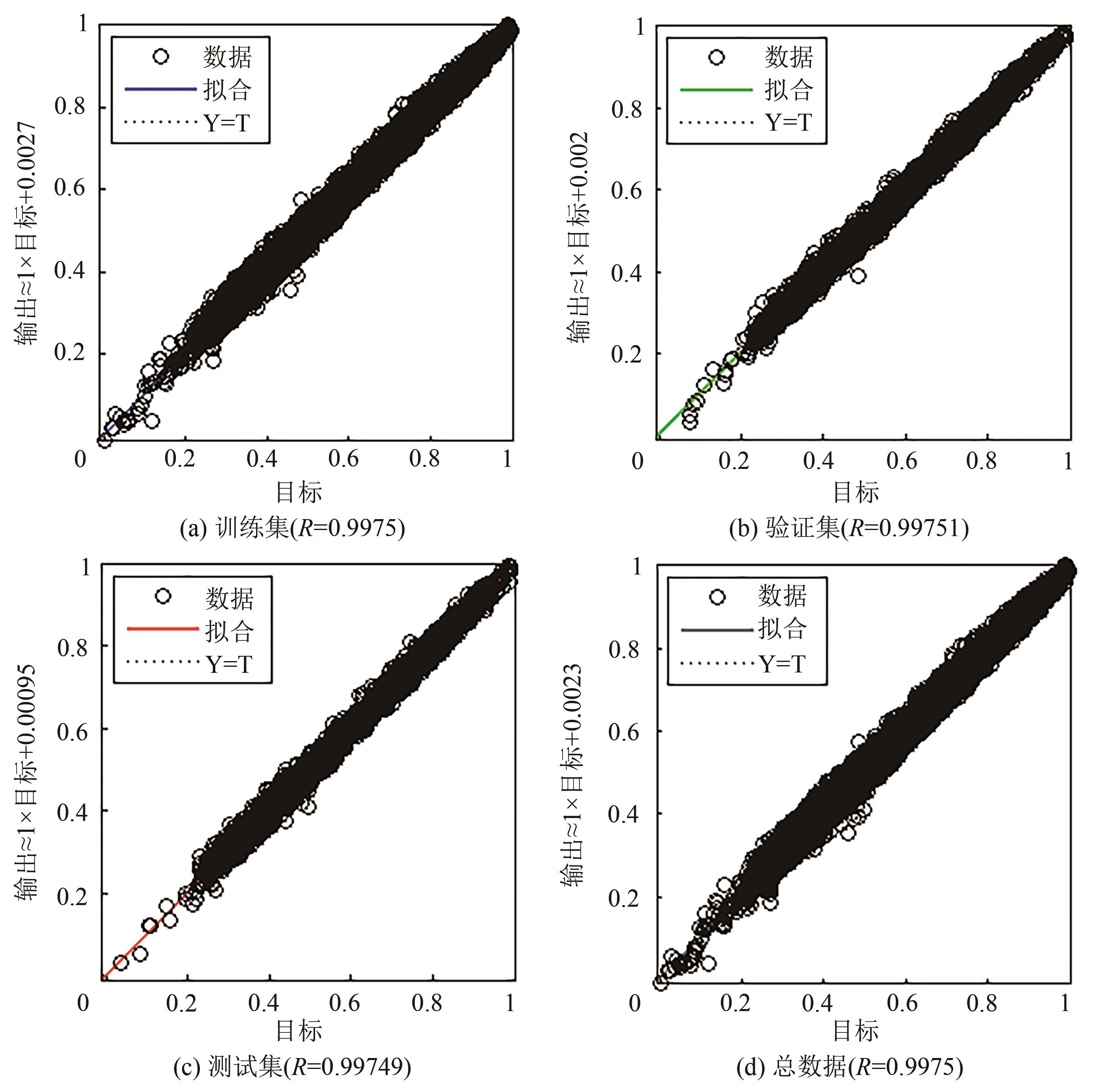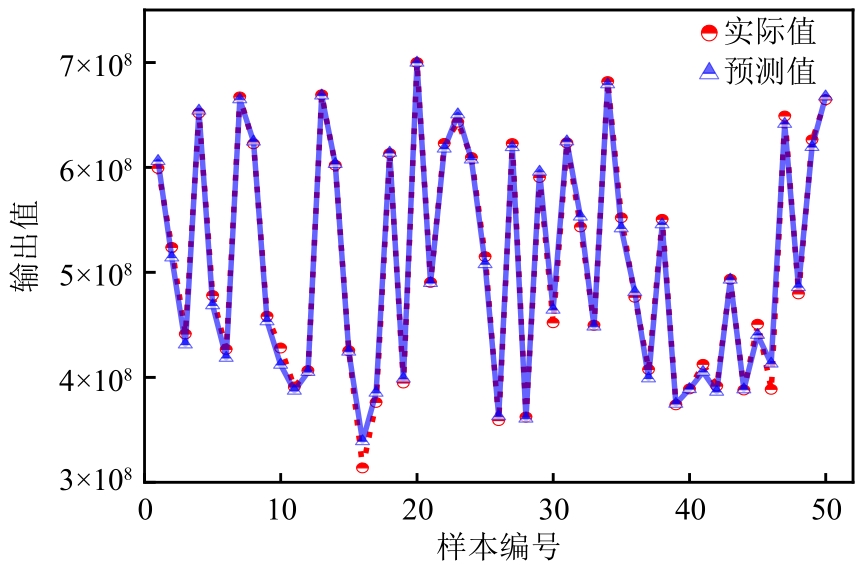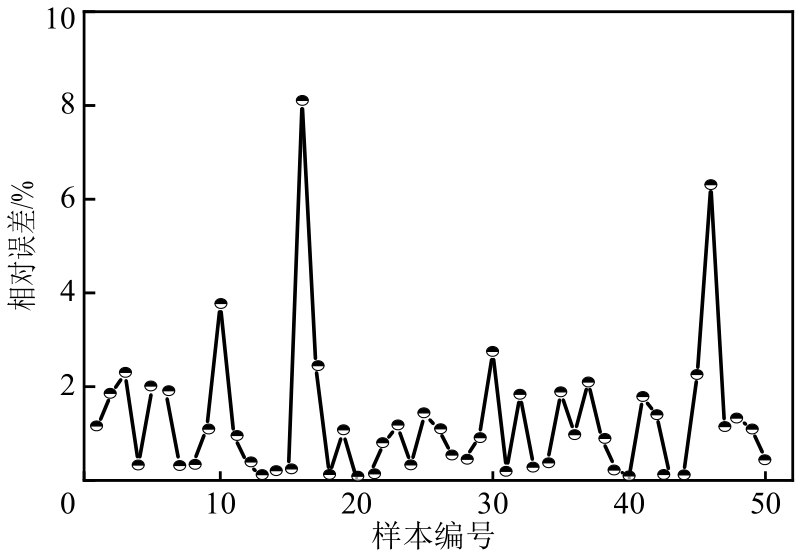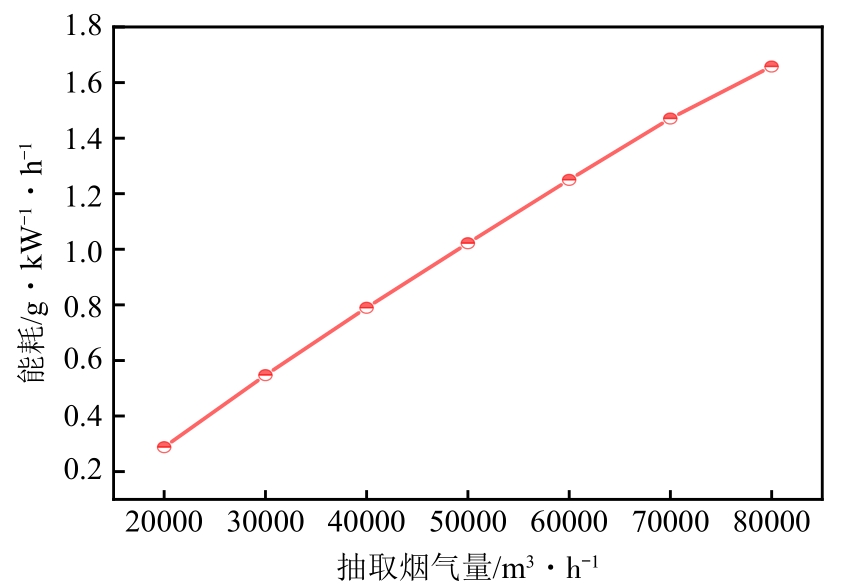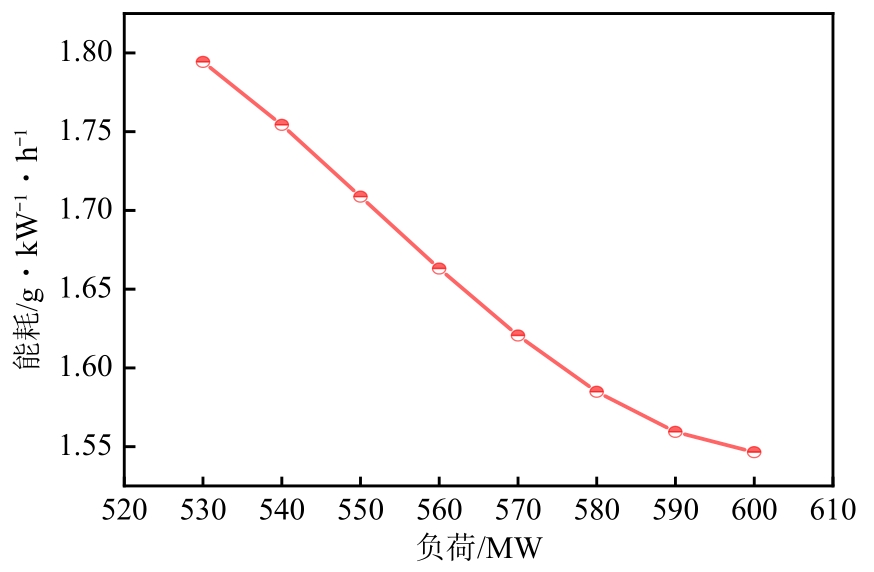化工进展 ›› 2024, Vol. 43 ›› Issue (6): 2968-2976.DOI: 10.16085/j.issn.1000-6613.2023-0808
• 化工过程与装备 • 上一篇
基于混合模型的脱硫废水旁路蒸发系统能耗特性
郑锁祺1( ), 詹凌霄1, 陈恒1, 李志浩1, 王禹瑞1, 赵宁2, 吴昊3, 杨林军1(
), 詹凌霄1, 陈恒1, 李志浩1, 王禹瑞1, 赵宁2, 吴昊3, 杨林军1( )
)
- 1.东南大学能源热转换及其过程测控教育部重点实验室,江苏 南京 210096
2.南方电网电力科技股份有限公司,广东 广州 510080
3.南京师范大学能源与机械工程学院,江苏 南京 210046
-
收稿日期:2023-05-15修回日期:2023-06-28出版日期:2024-06-15发布日期:2024-07-02 -
通讯作者:杨林军 -
作者简介:郑锁祺(1999—),男,硕士研究生,研究方向为电厂脱硫废水零排放。E-mail:18120151430@163.com。 -
基金资助:国家自然科学基金(52076046);中国南方电网有限责任公司科技项目(GDKJXM20183546)
Hybrid modeling for energy consumption prediction of desulfurization wastewater bypass evaporation system
ZHENG Suoqi1( ), ZHAN Lingxiao1, CHEN Heng1, LI Zhihao1, WANG Yurui1, ZHAO Ning2, WU Hao3, YANG Linjun1(
), ZHAN Lingxiao1, CHEN Heng1, LI Zhihao1, WANG Yurui1, ZHAO Ning2, WU Hao3, YANG Linjun1( )
)
- 1.Key Laboratory of Energy Thermal Conversion and Control of Ministry of Education, Southeast University, Nanjing 210096, Jiangsu, China
2.China Southern Power Grid Electric Power Technology Co. , Ltd. , Guangzhou 510080, Guangdong, China
3.School of Energy and Mechanical Engineering, Nanjing Normal University, Nanjing 210046, Jiangsu, China
-
Received:2023-05-15Revised:2023-06-28Online:2024-06-15Published:2024-07-02 -
Contact:YANG Linjun
摘要:
脱硫废水旁路蒸发系统抽取部分空预器入口热烟气会使锅炉效率降低、煤耗增加。为了实现对抽取热烟气造成能耗增加的精准预测,提出了一种机理模型与人工神经网络有机结合的混合模型预测方法。采集广东某660MW电厂的运行数据作为样本,以空气预热器进口的风温、空气的流量、抽取烟气量、抽取烟气温度、锅炉负荷以及给煤量6个参数作为输入,建立了用于预测经过空气预热器空气换热量的BP神经网络模型,对不同隐含层结构进行模拟计算,分析比较确定了网络的最优结构是6-9-1,最终模型的决定系数R2是0.99478,预测模型的相对误差在1%附近波动,整体预测效果较好。在此基础上结合机理模型,针对机组负荷波动及抽取烟气量波动的典型工况进行了能耗预测,获得了旁路蒸发系统能耗的定性规律。
中图分类号:
引用本文
郑锁祺, 詹凌霄, 陈恒, 李志浩, 王禹瑞, 赵宁, 吴昊, 杨林军. 基于混合模型的脱硫废水旁路蒸发系统能耗特性[J]. 化工进展, 2024, 43(6): 2968-2976.
ZHENG Suoqi, ZHAN Lingxiao, CHEN Heng, LI Zhihao, WANG Yurui, ZHAO Ning, WU Hao, YANG Linjun. Hybrid modeling for energy consumption prediction of desulfurization wastewater bypass evaporation system[J]. Chemical Industry and Engineering Progress, 2024, 43(6): 2968-2976.
| 激活函数 | 表达式 | 特征 |
|---|---|---|
| 线性函数 | 隐含层使用很少,输出层大多使用线性激活函数 | |
| Sigmoid函数 | 输出范围有限,优化稳定,但是输出不是0均值,会对梯度产生影响,且计算复杂度高,梯度容易饱和 | |
| ReLU函数 | 收敛速度快,计算复杂度低,但是输出不是0均值,会对梯度产生影响,且在负数区域梯度为0,参数不会更新 | |
| Tanh函数 | 输出是0均值,比Sigmoid函数更好,但是也存在计算复杂度高和梯度饱和的问题 |
表1 常用激活函数
| 激活函数 | 表达式 | 特征 |
|---|---|---|
| 线性函数 | 隐含层使用很少,输出层大多使用线性激活函数 | |
| Sigmoid函数 | 输出范围有限,优化稳定,但是输出不是0均值,会对梯度产生影响,且计算复杂度高,梯度容易饱和 | |
| ReLU函数 | 收敛速度快,计算复杂度低,但是输出不是0均值,会对梯度产生影响,且在负数区域梯度为0,参数不会更新 | |
| Tanh函数 | 输出是0均值,比Sigmoid函数更好,但是也存在计算复杂度高和梯度饱和的问题 |
| 干燥塔进口烟温 | 干燥塔进口烟气量 | 给煤量 | 负荷 | 空预器进口空气量 | 空预器进口风温 | 空气换热量 |
|---|---|---|---|---|---|---|
| 0.956979 | 0.836496 | 0.720752 | 0.954622 | 0.888625 | 0.652348 | 0.854049 |
| 0.873661 | 0.575778 | 0.332434 | 0.333233 | 0.299705 | 0.297202 | 0.298488 |
| 0.944153 | 0.819998 | 0.746497 | 0.891635 | 0.778692 | 0.28366 | 0.777118 |
| 0.867332 | 0.407029 | 0.351474 | 0.330307 | 0.325946 | 0.532653 | 0.311987 |
| 0.888292 | 0.547818 | 0.497718 | 0.406998 | 0.492009 | 0.17731 | 0.462425 |
| 0.955301 | 0.88907 | 0.707436 | 0.888013 | 0.780819 | 0.884997 | 0.699882 |
| 0.901099 | 0.748018 | 0.512921 | 0.576156 | 0.565119 | 0.563671 | 0.506752 |
表2 数据归一化后的值(部分)
| 干燥塔进口烟温 | 干燥塔进口烟气量 | 给煤量 | 负荷 | 空预器进口空气量 | 空预器进口风温 | 空气换热量 |
|---|---|---|---|---|---|---|
| 0.956979 | 0.836496 | 0.720752 | 0.954622 | 0.888625 | 0.652348 | 0.854049 |
| 0.873661 | 0.575778 | 0.332434 | 0.333233 | 0.299705 | 0.297202 | 0.298488 |
| 0.944153 | 0.819998 | 0.746497 | 0.891635 | 0.778692 | 0.28366 | 0.777118 |
| 0.867332 | 0.407029 | 0.351474 | 0.330307 | 0.325946 | 0.532653 | 0.311987 |
| 0.888292 | 0.547818 | 0.497718 | 0.406998 | 0.492009 | 0.17731 | 0.462425 |
| 0.955301 | 0.88907 | 0.707436 | 0.888013 | 0.780819 | 0.884997 | 0.699882 |
| 0.901099 | 0.748018 | 0.512921 | 0.576156 | 0.565119 | 0.563671 | 0.506752 |
| 神经元个数 | MBE | 平均值 | ||
|---|---|---|---|---|
| 一 | 二 | 三 | ||
| 2 | 6892513.3211 | -2822167.1741 | -2101531.9371 | 656271.4033 |
| 3 | -5351815.8001 | 3315812.8526 | 988267.0689 | -349245.2929 |
| 4 | 3913913.5601 | -828637.9895 | 987938.6265 | 1357738.0657 |
| 5 | -1242951.7323 | -1849339.7355 | 9887052.7689 | 2264920.4337 |
| 6 | -525002.9518 | 179773.4255 | 243898.5767 | -33776.9832 |
| 7 | 1992622.5258 | -2894768.4969 | 1151114.6201 | 82989.5497 |
| 8 | -1771804.0285 | 3508258.2168 | 1515944.737 | 1084132.9751 |
| 9 | -182151.9772 | 144585.5541 | 106790.281 | 23074.6193 |
| 10 | 1415264.9893 | -2153407.9302 | 499239.3915 | -79634.5165 |
| 11 | 1412136.032 | -643556.081 | -1685034.1342 | -305484.7277 |
| 12 | -1062843.6908 | 592883.3382 | -391757.2212 | -287239.1913 |
表3 不同隐含层神经元个数的MBE
| 神经元个数 | MBE | 平均值 | ||
|---|---|---|---|---|
| 一 | 二 | 三 | ||
| 2 | 6892513.3211 | -2822167.1741 | -2101531.9371 | 656271.4033 |
| 3 | -5351815.8001 | 3315812.8526 | 988267.0689 | -349245.2929 |
| 4 | 3913913.5601 | -828637.9895 | 987938.6265 | 1357738.0657 |
| 5 | -1242951.7323 | -1849339.7355 | 9887052.7689 | 2264920.4337 |
| 6 | -525002.9518 | 179773.4255 | 243898.5767 | -33776.9832 |
| 7 | 1992622.5258 | -2894768.4969 | 1151114.6201 | 82989.5497 |
| 8 | -1771804.0285 | 3508258.2168 | 1515944.737 | 1084132.9751 |
| 9 | -182151.9772 | 144585.5541 | 106790.281 | 23074.6193 |
| 10 | 1415264.9893 | -2153407.9302 | 499239.3915 | -79634.5165 |
| 11 | 1412136.032 | -643556.081 | -1685034.1342 | -305484.7277 |
| 12 | -1062843.6908 | 592883.3382 | -391757.2212 | -287239.1913 |
| 15 | ZHANG Mengxuan, LIU Hongchen, WANG Min, et al. Intelligence hybrid modeling method and applications in chemical process[J]. Chemical Industry and Engineering Progress, 2021, 40(4): 1765-1776. |
| 16 | 范峥, 田润芝, 林亮, 等. 利用基于PSO算法的径向基人工神经网络优化重催干气脱硫[J]. 化工进展, 2021, 40(6): 3107-3118. |
| FAN Zheng, TIAN Runzhi, LIN Liang, et al. Desulfurization optimization of reforming catalytic dry gas using radial basis artificial neural network based on PSO algorithm[J]. Chemical Industry and Engineering Progress, 2021, 40(6): 3107-3118. | |
| 17 | 郎军, 贺琼琼, 范徐萌, 等. 基于神经网络的潮湿煤炭气流分级效果预测[J]. 煤炭学报, 2021, 46(S2): 1001-1010. |
| LANG Jun, HE Qiongqiong, FAN Xumeng, et al. Prediction of airflow classification effect of wet coal based on BP neural network[J]. Journal of China Coal Society, 2021, 46(S2): 1001-1010. | |
| 18 | 赵宁, 冯永新, 林廷坤, 等. 热烟气环境下脱硫废水液滴蒸发特性研究进展[J]. 化工进展, 2021, 40(8): 4508-4514. |
| ZHAO Ning, FENG Yongxin, LIN Tingkun, et al. Research progresses on evaporation characteristics of desulfurization wastewater droplets in high-temperature flue gas[J]. Chemical Industry and Engineering Progress, 2021, 40(8): 4508-4514. | |
| 19 | 冯前源, 陈海杰, 李飞, 等. 脱硫废水旋转喷雾蒸发特性数值模拟[J]. 中南大学学报(自然科学版), 2022, 53(11): 4543-4551. |
| FENG Qianyuan, CHEN Haijie, LI Fei, et al. Numerical simulation of rotating spray evaporation characteristics of desulfurization wastewater[J]. Journal of Central South University (Science and Technology), 2022, 53(11): 4543-4551. | |
| 20 | 叶春松, 操容, 梁巍, 等. 脱硫废水高温烟气蒸发过程中氯盐和铵盐的分解[J]. 发电技术, 2019, 40(4): 362-366. |
| YE Chunsong, CAO Rong, LIANG Wei, et al. Decomposition of chloride and ammoniate in the evaporation process of desulfurization wastewater with high temperature flue gas[J]. Power Generation Technology, 2019, 40(4): 362-366. | |
| 21 | OHKI Akira, YAMADA Kenta, FURUZONO Takuya, et al. Analysis of trace elements in flue gas desulfurization water in the coal combustion system and the removal of boron and mercury from the water[J]. Energy & Fuels, 2011, 25(8): 3568-3573. |
| 22 | 陈应茂. 供热供电煤耗计算方法[J]. 热能动力工程, 1998, 13(2): 112-114. |
| 1 | 施云芬, 王旭晖. 湿法烟气脱硫废水处理研究进展[J]. 工业水处理, 2015, 35(12): 14-17, 43. |
| SHI Yunfen, WANG Xuhui. Research progress in the wastewater treatment of wet flue gas desulfurization[J]. Industrial Water Treatment, 2015, 35(12): 14-17, 43. | |
| 2 | 邓双, 张辰, 刘宇, 等. 基于实测的燃煤电厂氯排放特征[J]. 环境科学研究, 2014, 27(2): 127-133. |
| DENG Shuang, ZHANG Chen, LIU Yu, et al. A full-scale field study on chlorine emission of pulverized coal-fired power plants in China[J]. Research of Environmental Sciences, 2014, 27(2): 127-133. | |
| 3 | MA Shuangchen, CHAI Jin, CHEN Gongda, et al. Research on desulfurization wastewater evaporation: Present and future perspectives[J]. Renewable and Sustainable Energy Reviews, 2016, 58: 1143-1151. |
| 4 | 马双忱, 于伟静, 贾绍广, 等. 燃煤电厂脱硫废水处理技术研究与应用进展[J]. 化工进展, 2016, 35(1): 255-262. |
| MA Shuangchen, YU Weijing, JIA Shaoguang, et al. Research and application progresses of flue gas desulfurization(FGD) wastewater treatment technologies in coal-fired plants[J]. Chemical Industry and Engineering Progress, 2016, 35(1): 255-262. | |
| 5 | 吕武学, 于燕飞, 曲保忠, 等. 燃煤电厂脱硫废水零排放技术现状与发展[J]. 洁净煤技术, 2020, 26(4): 11-20. |
| Wuxue LYU, YU Yanfei, QU Baozhong, et al. Present situation and development of zero-discharge technology for desulfurization wastewater in coal-fired power plants[J]. Clean Coal Technology, 2020, 26(4): 11-20. | |
| 6 | 高原, 陈智胜. 新型脱硫废水零排放处理方案[J]. 华电技术, 2008, 30(4): 73-75. |
| GAO Yuan, CHEN Zhisheng. New treatment scheme of zero discharge for deSO x wastewater[J]. Huadian Technology, 2008, 30(4): 73-75. | |
| 7 | HONJO Shintaro, SUGITA Satoru, NAKAYAMA Yoshio, et al. MHI wet-FGD waste water treatment technologies[C]. Air and Waste Management Association—8th Power Plant Air Pollutant Control Mega Symposium 2010. 2010, 2: 1395-1429. |
| 8 | 袁伟中, 刘春红, 童小忠, 等. 燃煤锅炉采用烟气旁路干燥技术实现脱硫废水零排放[J]. 电力科技与环保, 2017, 33(3): 18-21. |
| YUAN Weizhong, LIU Chunhong, TONG Xiaozhong, et al. Coal-fired boiler flue gas bypass drying technology to achieve zero liquid discharge of desulfurization water[J]. Electric Power Technology and Environmental Protection, 2017, 33(3): 18-21. | |
| 9 | 张净瑞, 梁海山, 郑煜铭, 等. 基于旁路烟道蒸发的脱硫废水零排放技术在火电厂的应用[J]. 环境工程, 2017, 35(10): 5-9. |
| ZHANG Jingrui, LIANG Haishan, ZHENG Yuming, et al. Application of zero liquid discharge system of the desulfurization wastewater based on bypass flue evaporation system in thermal power plants[J]. Environmental Engineering, 2017, 35(10): 5-9. | |
| 10 | TENG Xinjun, STRANGE Robert, EASOM Bruce. A pilot demonstration of spray dryer evaporation as a method to treat power plant FGD wastewater[EB/OL]. [2023-05-05].. |
| 11 | 王正阳, 程阳, 赵德远, 等. 火力发电厂脱硫废水零排放技术的研究与应用进展[J]. 电站系统工程, 2019, 35(3): 46-48, 52. |
| WANG Zhengyang, CHENG Yang, ZHAO Deyuan, et al. Research and application of FGD wastewater zero-discharge technology in TPP[J]. Power System Engineering, 2019, 35(3): 46-48, 52. | |
| 12 | 魏俊岭, 王剑栋. 基于旁路烟道蒸发的脱硫废水零排放系统设计与应用[J]. 电力科技与环保, 2022, 38(2): 150-156. |
| WEI Junling, WANG Jiandong. Design and application of zero discharge system for desulfurization wastewater based on bypass flue evaporation[J]. Electric Power Technology and Environmental Protection, 2022, 38(2): 150-156. | |
| 13 | 王仁雷, 王丰吉, 戴瑜, 等. 300MW机组脱硫废水旁路蒸发干燥系统性能试验研究[J]. 工业用水与废水, 2021, 52(3): 23-26. |
| WANG Renlei, WANG Fengji, DAI Yu, et al. Performance test of bypass evaporation drying system for desulfurization wastewater from 300MW unit[J]. Industrial Water & Wastewater, 2021, 52(3): 23-26. | |
| 14 | KONDO Ruho, YAMAKAWA Shunsuke, MASUOKA Yumi, et al. Microstructure recognition using convolutional neural networks for prediction of ionic conductivity in ceramics[J]. Acta Materialia, 2017, 141: 29-38. |
| 15 | 张梦轩, 刘洪辰, 王敏, 等. 化工过程的智能混合建模方法及应用[J]. 化工进展, 2021, 40(4): 1765-1776. |
| 22 | CHEN Yingmao. A method for calculating coal consumption of heat and electricity supply[J]. Journal of Engineering for Thermal Energy and Power, 1998, 13(2): 112-114. |
| 23 | MCCULLOCH Warren S, PITTS Walter. A logical calculus of the ideas immanent in nervous activity[J]. The Bulletin of Mathematical Biophysics, 1943, 5(4): 115-133. |
| 24 | RUMELHART David E, HINTON Geoffrey E, WILLIAMS Ronald J. Learning representations by back-propagating errors[J]. Nature, 1986, 323(6088): 533-536. |
| 25 | 宋泓阳, 孙晓岩, 项曙光. 人工神经网络在化工过程中的应用进展[J]. 化工进展, 2016, 35(12): 3755-3762. |
| SONG Hongyang, SUN Xiaoyan, XIANG Shuguang. Progress on the application of artificial neural network in chemical industry[J]. Chemical Industry and Engineering Progress, 2016, 35(12): 3755-3762. | |
| 26 | 石明, 汪舟, 甘进, 等. 基于GA-BP神经网络的喷丸样品表层硬度预测模型[J]. 表面技术, 2022, 51(1): 332-338, 357. |
| SHI Ming, WANG Zhou, GAN Jin, et al. Microhardness prediction model of peened parts based on GA-BP neural network[J]. Surface Technology, 2022, 51(1): 332-338, 357. |
| [1] | 顾丽燕, 董伟钢, 刘峰均, 蔡晨健, 陈恒, 杨林军. 脱硫废水热烟气蒸发过程中挥发性组分迁移转化特性研究进展[J]. 化工进展, 2021, 40(S1): 434-438. |
| [2] | 赵宁, 冯永新, 林廷坤, 谢志文. 热烟气环境下脱硫废水液滴蒸发特性研究进展[J]. 化工进展, 2021, 40(8): 4508-4514. |
| [3] | 肖国振, 仲兆平, 姜超, 韩磊, 马天霆, 张杉, 金保昇. 氯添加对燃煤过程中汞析出规律的影响[J]. 化工进展, 2021, 40(12): 6557-6563. |
| [4] | 李飞, 陈海杰, 孙宗康, 谷小兵, 白玉勇, 高飞, 杨林军. 热风分布器结构对脱硫废水旋转喷雾蒸发特性影响的数值模拟[J]. 化工进展, 2020, 39(S2): 385-392. |
| [5] | 王兴俊, 周永春, 安德欣, 吴伟, 刘亚争, 林宸雨, 马双忱. 高镁脱硫废水软化和镁回收实验与机理分析[J]. 化工进展, 2019, 38(s1): 252-258. |
| [6] | 马双忱,陈嘉宁,万忠诚,向亚军,张净瑞,曲保忠. 高盐脱硫废水水泥化固定技术的研究现状与发展[J]. 化工进展, 2019, 38(9): 4275-4283. |
| [7] | 赵保华, 范紫瑄, 温佳琪, 张金柱, 马双忱. 燃煤电厂脱硫废水排放指标限值的计算方法研究[J]. 化工进展, 2018, 37(S1): 213-218. |
| [8] | 马双忱, 范紫瑄, 温佳琪, 马岚, 赵保华, 张金柱, 孙尧. 基于模糊层次分析的燃煤电厂脱硫废水处理可利用技术评价[J]. 化工进展, 2018, 37(11): 4451-4459. |
| [9] | 马双忱, 徐昉, 徐东升, 李德峰, 范紫瑄, 樊帅军, 庞蔚莹. 燃煤电厂脱硫废水氯离子检测现状与应用进展[J]. 化工进展, 2018, 37(10): 4044-4052. |
| [10] | 杨博, 李玉忠, 崔琳, 李广培, 董勇. Mg2+对脱硫废水电解-电渗析过程的影响[J]. 化工进展, 2017, 36(S1): 482-488. |
| [11] | 张胜寒, 孙晨皓, 陈玉强. 燃煤电厂脱硫废水中硒元素脱除技术研究进展[J]. 化工进展, 2017, 36(04): 1460-1469. |
| [12] | 马双忱, 于伟静, 贾绍广, 柴峰, 张润盘. 燃煤电厂脱硫废水处理技术研究与应用进展[J]. 化工进展, 2016, 35(01): 255-262. |
| 阅读次数 | ||||||
|
全文 |
|
|||||
|
摘要 |
|
|||||
